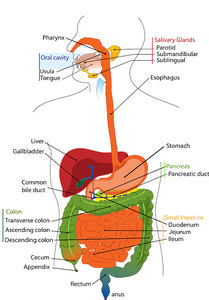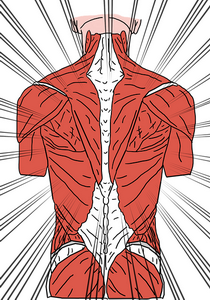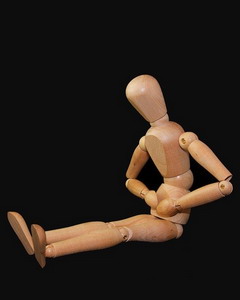
One of the more common complaints my patients have is stomach issues. Most everyone can relate to heartburn. It feels like a sharp burning feeling right in the chest around the heart area. Another feeling patients report is a lump in the throat, like a pill they swallowed got stuck halfway down. Sometimes the report is of an immediate bloating in the stomach area whenever they eat. Occasionally the symptoms are a little more vague like chronic hoarseness, bad breath, even asthma-like symptoms. Almost always there is some sort of discomfort in the stomach area. Frequently the cause of these symptoms is something called a hiatal hernia.

What is a hiatal hernia? A hernia in general is when something that is supposed to stay in one compartment of the body squeezes and pokes out of where it belongs. In this case a hiatal hernia is when the top of the stomach pokes out from the abdominal cavity and into the chest cavity. These two cavities are separated by the diaphragm muscle. This is a dome-shaped muscle. When it contracts, it pulls down the bottom of the lungs in order to pull air into the lower portion of the lungs. In the middle of the dome, there is an opening, the hiatus, which lets the esophagus (food tube) pass through to the stomach so food can travel from your mouth to your stomach. When the diaphragm muscle is not working right the opening can get too large. When that happens the top of the stomach can slip upward into the chest area. If that was all that happened you probably wouldn’t even notice it. But the top of the stomach contains a valve that is supposed to stay closed most of the time to keep the highly corrosive stomach acid in the stomach. Normally the valve only opens when you swallow a bite of food and it moves down to the valve. But when the stomach slides up that valve does not close properly and stomach acid can wash up into the esophagus and acid burn it. This is heartburn. Heartburn is actually esophagus acid burn.

The fun does not stop there. That acid can vaporize and travel up to the throat burning the vocal cords causing hoarseness and it can even travel into the lungs burning there and causing asthma. The body can not tolerate such strong acid anywhere but the stomach, so one response the body may take is to reduce the stomach acid to protect the esophagus. The problem here is that we need that strong acid to sterilize our food, breakdown proteins, and ionize our minerals so they can be absorbed. When that acid level goes down, digestion fails creating bloating. Additionally the lower acid can allow bacteria to grow in the gut causing all sorts of problems. In the stomach itself the bacteria that likes to grow there is called H. pylori, which then creates chronic stomach inflammation. So the simple slippage of the stomach upward can create all sorts of problems.

What causes hiatal hernias? As with everything, there are several factors that can contribute to the manifestation. One simple mechanical factor is the proper functioning of the spine. If the pelvis is unbalanced it will create small curvatures in the middle back which distort the placement of the ribs the diaphragm attaches to. If the ribs get unbalanced right to left, the pull on the diaphragm gets distorted causing the muscle to become weaker. This weakness translates to the poor ability of the hiatus (hole) at the top of the dome muscle to hold tightly to the esophagus and keep the stomach from sliding up.

A second cause is the fight or flight stress reaction. The diaphragm muscle also serves as part of the abdominal core stabilizers that tighten up to strengthen the core so you can run or fight. When the diaphragm acts as a stabilizer it tightens and flattens downward, which pulls that hiatus from all sides making it larger. With the opening larger the stomach can slide up. In the ancient environment we were designed for, we only went into fight or flight for a couple minutes at a time – either to catch dinner or avoid becoming someone’s dinner. In these situations the stomach motility is suppressed and digestion is shut down so the stomach does not slide around. But these days we have chronic stress, even while we are eating. The diaphragm can be tight while the stomach is moving around trying to digest our food. This creates sliding hernias.

A third cause is the neurologic imbalance in our autonomic nervous system created by stress. Our autonomic nervous system has two sides – the sympathetic action side and the parasympathetic relax and digest side. These two systems control all our organs and glands. We are designed to be in a parasympathetic dominant state most of the time. When we are under stress, the sympathetic nervous system takes over and pumps out adrenaline which tenses up muscles preparing them for immediate action. The swallowing action of the throat involves muscles wrapping around the food tube (esophagus). When they tense up they actually contract the esophagus and pull the stomach upwards, creating the hiatal hernia. You can casuallysee this state by watching your belly while you are breathing. In a sympathetic dominant state, all your breathing will be in the upper chest. In a parasympathetic state, your breathing will be deep and down into your belly. This is sometimes called diaphragm breathing.

As you can see, two of the three main reasons for a hiatal hernia are rooted in stress. The third reason – the imbalance in the ribs can be easily addressed Chiropractically. Once I have adjusted the ribs, I actually pull the stomach back down into proper position with a stomach adjustment. Getting past the chronic stress is the big issue. Many of my newsletters address different aspects of stress, but for direct intervention, the basic intent is to try to switch the body from sympathetic dominance to parasympathetic dominance. The process to do this is called vagal stimulation. The vagus nerve from the brain carries most of the parasympathetic nerves to the organs. Anything we can do to stimulate this nerve helps calm down hiatal hernias and improve digestion.

The vagus nerve can be stimulated in many ways. Medicine has developed fancy devices that work like heart pacemakers. They are implanted under the skin and electrically stimulate the vagus nerve directly. Other devices can stimulate branches of the nerve that go to the earlobes. Simpler methods we can use involve tricking the brain into thinking we are eating, which normally turns the vagus nerve on to tell the stomach to digest our food. Anything that stimulates the back of the throat, like singing, chanting, touching the back of the throat with a tongue depressor, gargling, possibly even gum-chewing, all stimulate the vagus nerves. Adaptation to cold also stimulates the vagus nerve. So, ice baths, cold showers, and sticking your face in ice water turns on this nerve.

Probably the easiest way to stimulate the vagus comes from reading Dr. Porges’ book “Polyvagal Theory” and Stanley Rosenberg’s book “Accessing the Healing Power of the Vagus Nerve”. They probably know more about the autonomic nervous system than any other researchers today. Rosenberg describes a process he calls the Basic Reset. I presented this a couple of years ago in this newsletter. Basically it involves interlacing your fingers behind your head and turning your eyes (not the head) as far as you can to the right for 30 to 60 seconds and just breathing. You are watching for a change in your breathing – deeper breaths, a sigh, a swallow, a yawn. When this happens you switch your eyes to the left and do the same thing. This process resets the balance of the top vertebra in your neck, the atlas. This vertebra directly affects the vagus nerve. This goes a long way towards settling down the sliding hiatal hernia.

Additionally, you can use visceral massage to pull down the stomach after you have re-established a state if ease (parasympathetic dominance). Press in under the edge of the ribs over the stomach area and gently, but deeply, pull down several times. Spend a couple of minutes doing deep belly breathing after this to reset the diaphragm muscles.
Ultimately resolving hiatal hernias means making different life choices that will relieve you from the chronic stress you are experiencing.
Take care,
David
